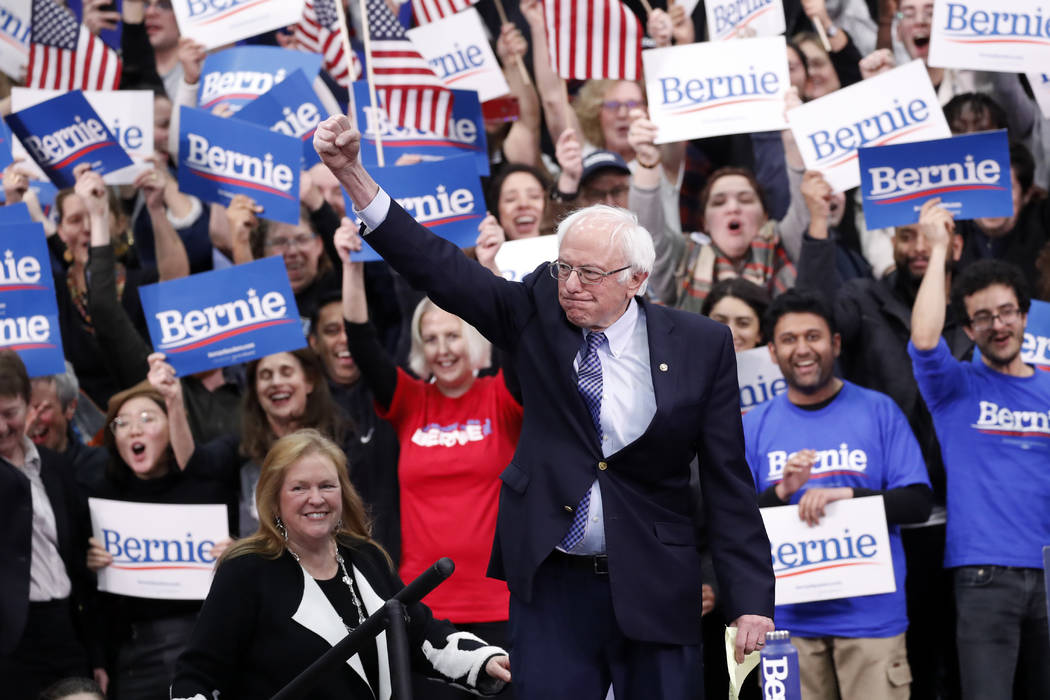Democratic candidates flood Nevada, caucus uncertainty remains

With the 2020 New Hampshire primary in the past, most of the eight remaining Democratic presidential candidates have started their journeys to the Silver State for the final push to the Feb. 22 Nevada caucuses.
Six candidates — Sens. Bernie Sanders, Elizabeth Warren and Amy Klobuchar, businessman Tom Steyer, former South Bend Mayor Pete Buttigieg and former Vice President Joe Biden — have events planned in Clark County over the next six days, beginning Thursday.
It’s unclear whether Rep. Tulsi Gabbard, the seventh candidate on the Nevada ballot, will campaign in the state. She traveled to South Carolina, which holds a primary on Feb. 29.
Entrepreneur Andrew Yang had a slew of Las Vegas events planned for this week before dropping out of the race during the New Hampshire primary. Sen. Michael Bennet and former Massachusetts Gov. Deval Patrick also dropped out Tuesday.
Former New York Mayor Michael Bloomberg is not competing in the early states.
The six leading candidates will join hundreds of their staff members and thousands of volunteers to make their case to the voters of the first ethnically diverse state in the early lineup. Sanders, Buttigieg and Klobuchar bring momentum from the first two contests, but Steyer, Warren and Biden have built large operations in Nevada and believe the diverse electorate will be a launching point for their own victories.
How these six possible victories will be calculated, however, remains a mystery to both the candidates and the voters themselves.
The Nevada Democratic Party released a memo Tuesday morning offering new information on how early caucusing, which begins on Saturday and runs through Tuesday, will work.
But several top campaigns expressed their continued frustration with both the lack of answers to their top question — what systems will be used to determine delegates and, ultimately, a winner — and how the information has been shared.
“Not much has changed,” one senior staff member for a Nevada campaign said. “The memo didn’t shed any new light on a lot of things.”
The staff member said big questions remain about how early caucus preferences will be distributed and used on caucus day, as well as the biggest question: How will the 2,099 volunteer precinct chairs transmit results to the party’s headquarters on caucus day?
The party had originally planned to use mobile applications, but scrapped them after a similar app failed during the Iowa caucuses. It has since taken a public “no-app” stance and strongly hinted at moves to paper-and-pen caucuses, but even that stance was challenged Wednesday by the campaigns.
“They have just not been forthcoming, using language like ‘it’s a tool, not an app,’” a senior staffer for another Nevada campaign said. “Any software on a mobile device is an app. We understand you don’t want to be like Iowa, but you can be forthcoming with us.”
Another member of a third campaign echoed these statements, while noting the frustration of learning more about the caucuses from media reports than the party itself.
The party did not have any additional information to share on either the early or traditional caucuses as of Wednesday morning, spokeswoman Molly Forgey said.
Contact Rory Appleton at RAppleton@reviewjournal.com or 702-383-0276. Follow @RoryDoesPhonics on Twitter.